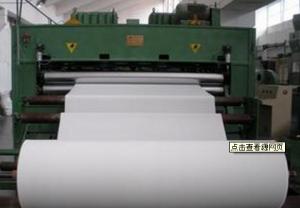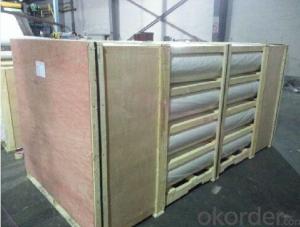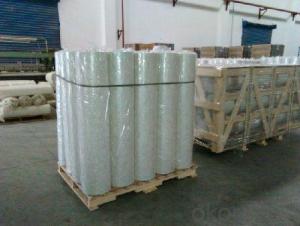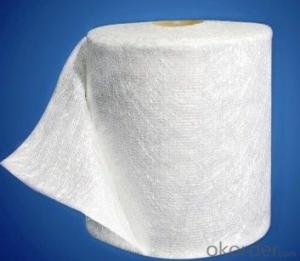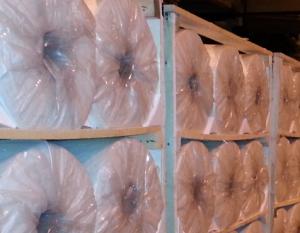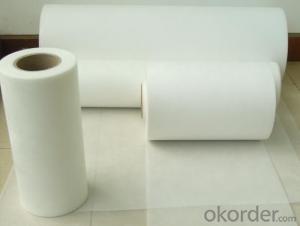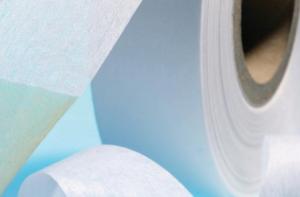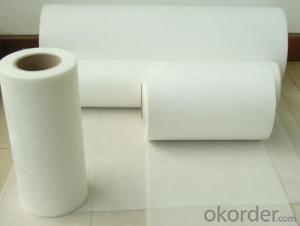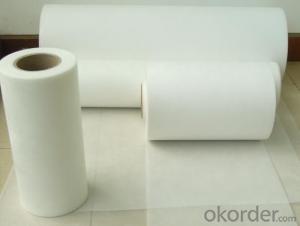Fiberglass Mat Tissue Fiberglass Surfacing Tissue
- Loading Port:
- China Main Port
- Payment Terms:
- TT or LC
- Min Order Qty:
- 144000 Square Meter m²
- Supply Capability:
- 600000 Square Meter Per Month m²/month
OKorder Service Pledge
OKorder Financial Service
You Might Also Like
Introduction of Fiberglass surfacing tissue
Fiberglass surfacing tissue is mainly used for the surface layers of FRP products. It has good capability like fiber dispersion, smooth surface, low binder content, fast resin impregnation and good mould obedience. It is capable of significantly improving the strength of FRP surface layer, strong impaction resistance, excellent uniformity of surface, good covering up the texture of under layers and good corrosion resistance.
Specification of Fiberglass surfacing tissue
Size: 20g/, 30g/, 35g/, etc.
Width: 50mm, 75mm, 100mm, 1000mm, etc.
Length: 400m, 500m, 1000m, etc.
Product Characteristics of Fiberglass surfacing tissue
1.Uniform fiber dispersion
2.Smooth surface and soft hand-feeling
3.Low binder content
4.Fast resin impregnation
5.Good mould obedience
6.Good corrosion resistance
7.Strong impact resistance
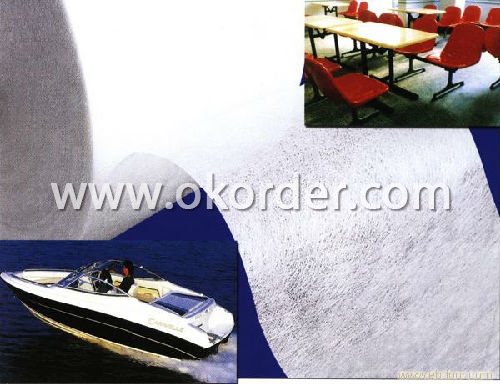
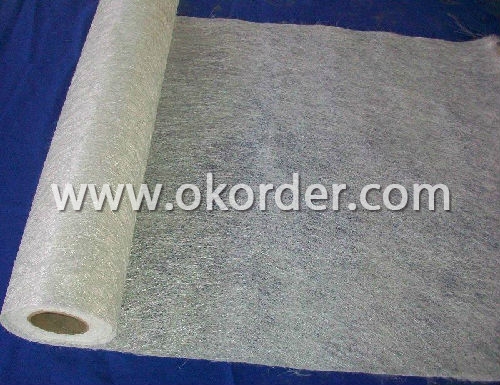
- Q: How does fiberglass mat tissue perform in terms of air permeability?
- Fiberglass mat tissue is characterized by its low air permeability. Its tight weave and construction, using fiberglass strands, result in less porosity, thereby allowing minimal airflow. This quality renders fiberglass mat tissue appropriate for situations that require minimal air permeability, such as insulation or filtration systems. By limiting the flow of air, fiberglass mat tissue enhances thermal insulation and enhances filtration efficiency.
- Q: Can fiberglass mat tissue be used for flooring insulation?
- No, fiberglass mat tissue is typically not used for flooring insulation. It is more commonly used in applications such as roofing, wall insulation, and soundproofing. For flooring insulation, materials like foam, cellulose, or mineral wool are typically preferred.
- Q: What is the typical thickness range of fiberglass mat tissue?
- The specific application and manufacturer can cause the typical thickness range of fiberglass mat tissue to vary. Typically, fiberglass mat tissue can be found in thicknesses ranging from 0.2 mm to 0.5 mm. This range provides flexibility in choosing the suitable thickness according to the desired strength, durability, and specific requirements of the intended use. It is important to mention that slight variations in thickness may occur due to manufacturing processes and individual product specifications.
- Q: Can fiberglass mat tissue be used for making fiberglass molds?
- Fiberglass molds can be made using fiberglass mat tissue. This lightweight material is composed of randomly oriented fiberglass strands and is commonly utilized in composite manufacturing to reinforce fiberglass laminates and enhance their strength. For the production of fiberglass molds, the mat tissue can be employed as a surface layer to achieve a smooth and durable finish. Its application helps prevent the formation of air bubbles, increases the mold's overall strength, and provides a suitable surface for the use of release agents or gel coats. Nevertheless, it is important to acknowledge that relying solely on fiberglass mat tissue may not be enough to create a sturdy and long-lasting mold. It is often combined with other fiberglass materials, such as chopped strand mat or woven roving, to bolster the mold's strength and thickness. In summary, fiberglass mat tissue can be a valuable component in the production of fiberglass molds, but it is typically utilized in conjunction with other materials to attain the desired properties.
- Q: Is fiberglass mat tissue suitable for high-temperature applications?
- No, fiberglass mat tissue is not suitable for high-temperature applications. Fiberglass mat tissue is typically made from thin strands of glass fibers that are woven together to create a non-woven fabric. While fiberglass is known for its strength and durability, it has a low melting point and is not designed to withstand high temperatures. When exposed to high temperatures, fiberglass mat tissue can melt or degrade, leading to structural weakness and potential failure. Therefore, it is important to select a different material that is specifically designed for high-temperature applications, such as ceramic or silicone-based products.
- Q: Can fiberglass mat tissue be used for corrosion-resistant coatings?
- Yes, fiberglass mat tissue can be used for corrosion-resistant coatings. It is commonly used as a reinforcing material in composite coatings to enhance their resistance against corrosion and other environmental factors.
- Q: Can fiberglass mat tissue be used for making lightweight ceilings?
- Yes, fiberglass mat tissue can be used for making lightweight ceilings. It is a strong and lightweight material that is commonly used in construction for its fire resistance, durability, and insulation properties. It can be easily molded and shaped to create lightweight ceiling panels, making it an ideal choice for applications where weight reduction is desired.
- Q: What is the specific gravity of fiberglass mat tissue?
- The specific gravity of fiberglass mat tissue may differ based on its specific composition and how it is manufactured. On the whole, however, fiberglass mat tissue generally falls within a specific gravity range of 1.8 to 2.2. Specific gravity is a measurement that compares the density of a substance to a reference substance, typically water. When a substance has a specific gravity of 1.0, it means its density is equal to that of water. A specific gravity greater than 1.0 indicates a higher density. Consequently, the specific gravity of fiberglass mat tissue implies that it is denser than water.
- Q: What is the expected lifespan of fiberglass mat tissue in cleanroom applications?
- Several factors can influence the expected lifespan of fiberglass mat tissue in cleanroom applications. The durability and long-lasting properties of fiberglass mat tissue are well-known in cleanrooms. However, variables such as contamination level, cleaning procedures, maintenance practices, and overall cleanroom conditions can impact its lifespan. By providing proper care and regular maintenance, fiberglass mat tissue can typically endure for several years in cleanroom applications. Extending its lifespan can be achieved through frequent cleaning and replacing any damaged or contaminated sections. Following the manufacturer's guidelines and recommendations for cleaning and maintenance is crucial to ensure optimal performance and longevity. Furthermore, the expected lifespan of fiberglass mat tissue can also be influenced by its quality and grade. Higher-quality materials exhibit greater resilience and can withstand environmental stressors better than lower-grade options. Therefore, investing in high-quality fiberglass mat tissue can contribute to a longer lifespan in cleanroom applications. To summarize, there is no definitive answer regarding the exact expected lifespan of fiberglass mat tissue in cleanroom applications. However, regular maintenance, proper care, and the use of high-quality materials can significantly increase its longevity.
- Q: Is the Teflon gasket filled with fiberglass or graphite?
- PTFE generally used in static sealing, flange what, dynamic seal with FFKM, chemical resistance and PTFE, but with rubber elasticity
1. Manufacturer Overview
| Location | Hebei,China |
| Year Established | 2008 |
| Annual Output Value | Above US$20 Million |
| Main Markets | Mid East;Western Europe:South Asian |
| Company Certifications | ISO9001:2000;ISO14001:1996;GB/T28001:2001 |
2. Manufacturer Certificates
| a) Certification Name | |
| Range | |
| Reference | |
| Validity Period |
3. Manufacturer Capability
| a) Trade Capacity | |
| Nearest Port | Tianjin |
| Export Percentage | 80% |
| No.of Employees in Trade Department | 350 People |
| Language Spoken: | English;Chinese;Korean |
| b) Factory Information | |
| Factory Size: | Above 100,000 square meters |
| No. of Production Lines | Above 12 |
| Contract Manufacturing | OEM Service Offered;Design Service Offered |
| Product Price Range | Average |
Send your message to us
Fiberglass Mat Tissue Fiberglass Surfacing Tissue
- Loading Port:
- China Main Port
- Payment Terms:
- TT or LC
- Min Order Qty:
- 144000 Square Meter m²
- Supply Capability:
- 600000 Square Meter Per Month m²/month
OKorder Service Pledge
OKorder Financial Service
Similar products
Hot products
Hot Searches
Related keywords










